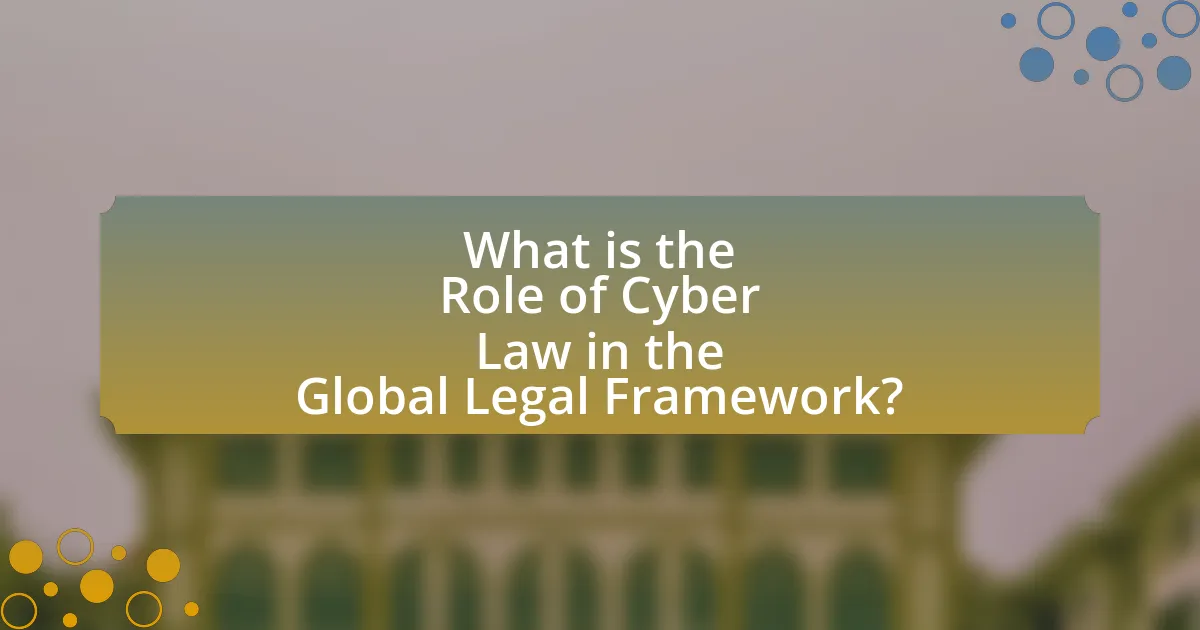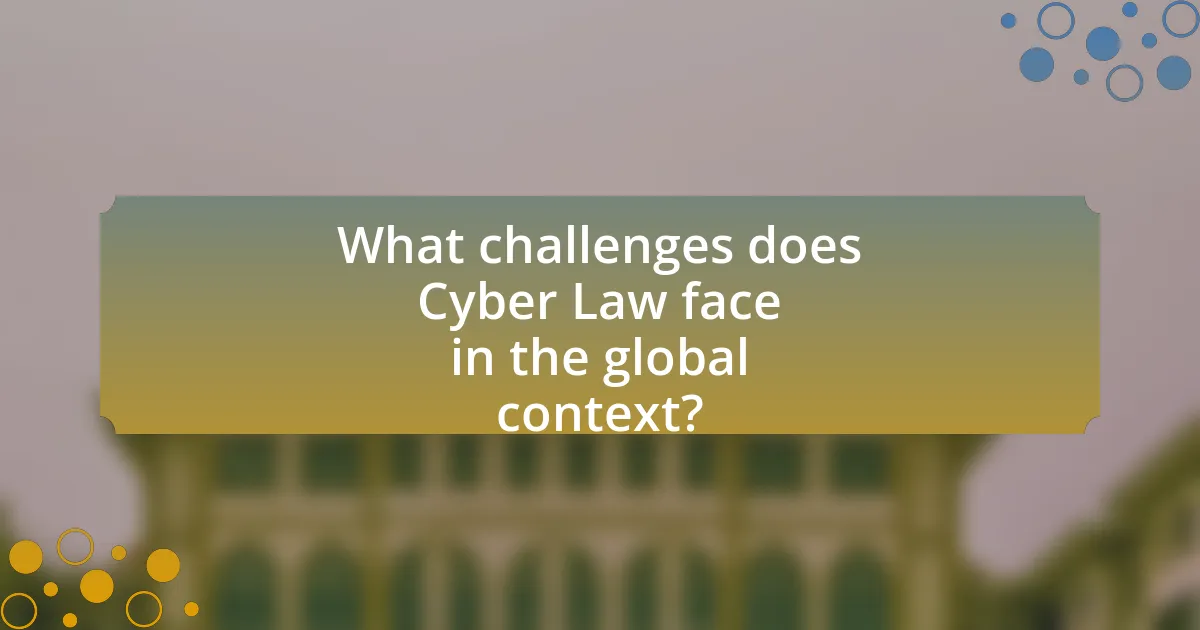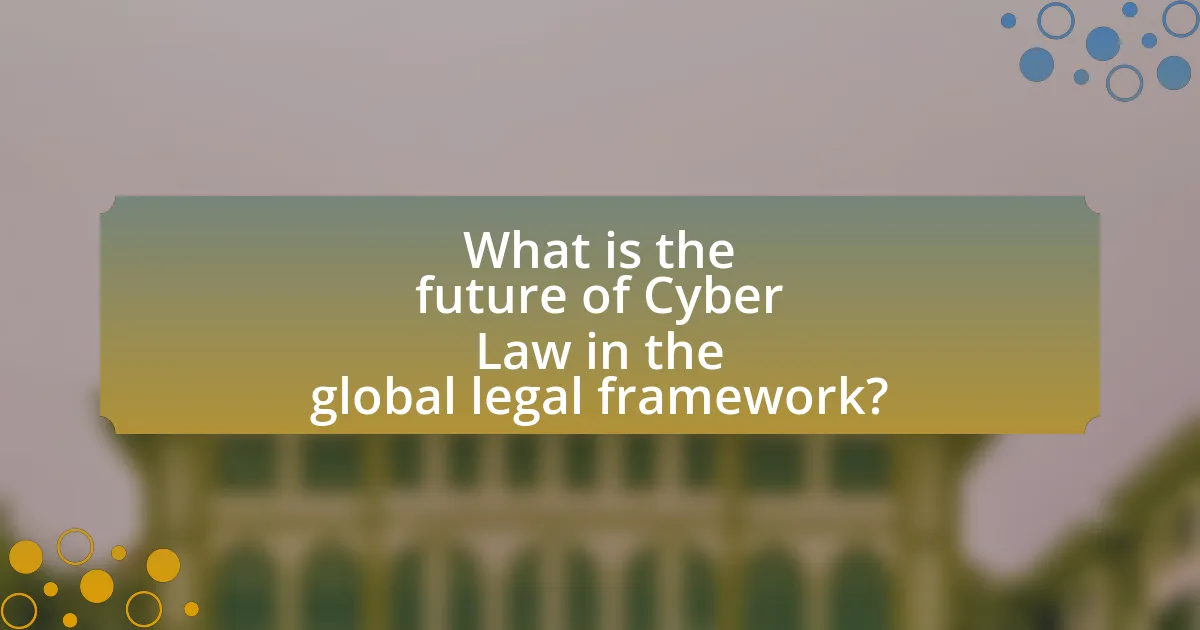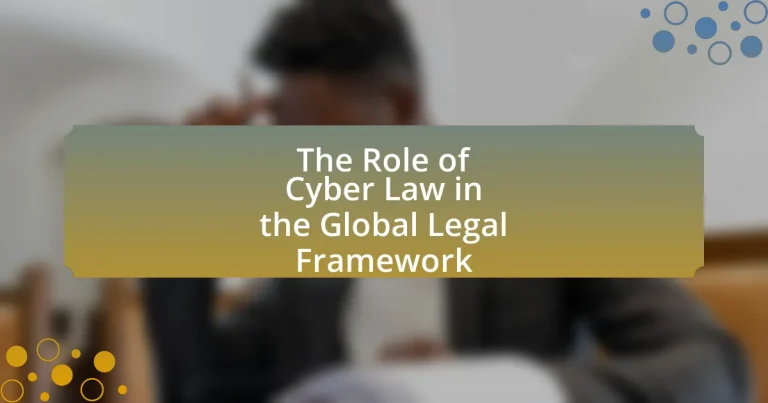Cyber law is a critical component of the global legal framework, establishing regulations that govern online activities, ensure cybersecurity, and protect digital rights. The article explores the influence of cyber law on international relations, highlighting key principles such as jurisdiction, data protection, and intellectual property rights. It examines how different countries implement cyber law, the essential role it plays in today’s digital age, and the risks associated with its absence. Additionally, the article addresses the challenges cyber law faces globally, including jurisdictional issues and the impact of emerging technologies, while emphasizing the importance of international cooperation and evolving legal frameworks to address new cyber threats.

What is the Role of Cyber Law in the Global Legal Framework?
Cyber law plays a crucial role in the global legal framework by establishing regulations that govern online activities, ensuring cybersecurity, and protecting digital rights. It addresses issues such as data protection, intellectual property rights, and cybercrime, which are increasingly relevant in a digitally interconnected world. For instance, the General Data Protection Regulation (GDPR) implemented by the European Union sets a precedent for data privacy laws globally, influencing how countries formulate their own cyber laws. Additionally, international treaties like the Budapest Convention on Cybercrime facilitate cooperation among nations to combat cybercrime, highlighting the necessity of a cohesive legal approach to address cross-border cyber issues.
How does Cyber Law influence international relations?
Cyber Law significantly influences international relations by establishing legal frameworks that govern online behavior and cybersecurity among nations. These laws facilitate cooperation in combating cybercrime, protecting intellectual property, and ensuring data privacy, which are essential for maintaining diplomatic relations. For instance, the Budapest Convention on Cybercrime, adopted in 2001, serves as a key international treaty that promotes collaboration among countries to address cybercrime effectively. This treaty has been ratified by over 60 countries, demonstrating its impact on fostering international cooperation in cybersecurity efforts. Additionally, the rise of cyber threats has led to increased dialogue and agreements between nations, such as the U.S.-China Cyber Agreement, aimed at reducing cyber espionage and enhancing trust. Thus, Cyber Law plays a crucial role in shaping the dynamics of international relations by promoting legal standards and collaborative efforts in the digital realm.
What are the key principles of Cyber Law that affect global interactions?
The key principles of Cyber Law that affect global interactions include jurisdiction, data protection, intellectual property rights, and cybersecurity regulations. Jurisdiction determines which country’s laws apply in cross-border cyber incidents, impacting how legal actions are pursued internationally. Data protection laws, such as the General Data Protection Regulation (GDPR) in the European Union, establish standards for handling personal data, influencing global business practices and compliance requirements. Intellectual property rights safeguard digital content and innovations, affecting how companies operate and share information across borders. Cybersecurity regulations, including frameworks like the NIST Cybersecurity Framework, set standards for protecting information systems, thereby enhancing international cooperation in combating cyber threats. These principles collectively shape the legal landscape for global digital interactions, ensuring accountability and protection in the cyber realm.
How do different countries implement Cyber Law in their legal systems?
Different countries implement Cyber Law through a combination of national legislation, international treaties, and regulatory frameworks tailored to their specific legal systems. For instance, the United States employs the Computer Fraud and Abuse Act and the Digital Millennium Copyright Act to address cybercrime and intellectual property issues, while the European Union enforces the General Data Protection Regulation (GDPR) to protect personal data across member states. In India, the Information Technology Act provides a legal framework for electronic commerce and cybercrime, reflecting the country’s unique socio-economic context. These implementations are often influenced by international standards set by organizations such as the United Nations and the International Telecommunication Union, which promote cooperation and harmonization of cyber laws globally.
Why is Cyber Law essential in today’s digital age?
Cyber Law is essential in today’s digital age because it establishes legal frameworks that govern online behavior, protect intellectual property, and ensure cybersecurity. As digital transactions and communications increase, the risk of cybercrime, data breaches, and privacy violations also rises. For instance, the global cost of cybercrime is projected to reach $10.5 trillion annually by 2025, highlighting the urgent need for robust legal measures. Cyber Law addresses these challenges by providing regulations that hold individuals and organizations accountable, thereby fostering trust in digital environments and promoting safe online interactions.
What are the risks associated with the absence of Cyber Law?
The absence of Cyber Law significantly increases the risks of cybercrime, data breaches, and privacy violations. Without legal frameworks, individuals and organizations lack protection against malicious activities such as hacking, identity theft, and online fraud, which have been reported to cost the global economy over $1 trillion annually. Additionally, the absence of regulations can lead to inadequate data protection, resulting in unauthorized access to sensitive information and loss of consumer trust. Furthermore, without Cyber Law, there is no accountability for cybercriminals, making it difficult to prosecute offenders and deter future crimes.
How does Cyber Law protect individuals and organizations online?
Cyber Law protects individuals and organizations online by establishing legal frameworks that govern internet usage, data protection, and cybersecurity. These laws, such as the General Data Protection Regulation (GDPR) in Europe, mandate that organizations must obtain consent before collecting personal data and ensure its security, thereby safeguarding individuals’ privacy rights. Additionally, Cyber Law addresses cybercrimes, such as hacking and identity theft, by providing legal recourse for victims and penalties for offenders, which deters malicious activities. For instance, the Computer Fraud and Abuse Act in the United States criminalizes unauthorized access to computer systems, reinforcing the protection of both individuals and organizations against cyber threats.
What are the main components of Cyber Law?
The main components of Cyber Law include data protection, intellectual property rights, cybersecurity regulations, electronic contracts, and online privacy. Data protection laws, such as the General Data Protection Regulation (GDPR), establish guidelines for the collection and processing of personal information. Intellectual property rights protect digital content and software from unauthorized use. Cybersecurity regulations mandate measures to protect networks and data from cyber threats. Electronic contracts provide legal recognition to digital agreements, while online privacy laws govern the handling of personal data in the digital space. These components collectively form the framework that governs online activities and protects users in the digital environment.
What types of regulations fall under Cyber Law?
Cyber Law encompasses various types of regulations, including data protection laws, privacy regulations, cybersecurity laws, intellectual property laws related to digital content, and e-commerce regulations. Data protection laws, such as the General Data Protection Regulation (GDPR) in the European Union, establish guidelines for the collection and processing of personal information. Privacy regulations focus on the rights of individuals regarding their personal data, while cybersecurity laws aim to protect networks and systems from cyber threats. Intellectual property laws address the protection of digital creations, and e-commerce regulations govern online transactions and consumer rights. These regulations collectively form a framework that addresses the complexities of digital interactions and the protection of rights in the cyber domain.
How do these regulations vary across different jurisdictions?
Cyber law regulations vary significantly across different jurisdictions due to differences in legal frameworks, cultural values, and technological advancements. For instance, the European Union enforces the General Data Protection Regulation (GDPR), which mandates strict data protection and privacy standards, while the United States employs a more fragmented approach with sector-specific laws like the Health Insurance Portability and Accountability Act (HIPAA) and the California Consumer Privacy Act (CCPA). Additionally, countries like China implement stringent internet censorship and surveillance laws, reflecting their governance model. These variations illustrate how local legal, social, and economic contexts shape cyber law, leading to diverse regulatory environments globally.
How does Cyber Law interact with other areas of law?
Cyber Law interacts with other areas of law by addressing legal issues arising from the use of technology and the internet, which often overlap with intellectual property, privacy, and criminal law. For instance, intellectual property law is impacted by Cyber Law through regulations on copyright infringement in digital formats, as seen in cases like the 2012 Supreme Court ruling in Golan v. Holder, which upheld the protection of foreign works. Additionally, privacy law intersects with Cyber Law in the context of data protection regulations, such as the General Data Protection Regulation (GDPR) in the European Union, which sets strict guidelines on personal data handling. Furthermore, Cyber Law influences criminal law by establishing legal frameworks for cybercrimes, including hacking and identity theft, as evidenced by the Computer Fraud and Abuse Act in the United States, which criminalizes unauthorized access to computer systems. These interactions demonstrate that Cyber Law is integral to the evolving landscape of legal frameworks in response to technological advancements.
What is the relationship between Cyber Law and intellectual property law?
Cyber Law and intellectual property law are interconnected as both govern the use and protection of digital content and assets. Cyber Law addresses legal issues related to the internet and digital communication, while intellectual property law specifically protects creations of the mind, such as inventions, literary and artistic works, and symbols. The relationship is evident in how Cyber Law facilitates the enforcement of intellectual property rights online, ensuring that copyright, trademarks, and patents are upheld in the digital environment. For instance, the Digital Millennium Copyright Act (DMCA) in the United States provides a framework for addressing copyright infringement on the internet, highlighting the synergy between these two legal domains.
How does Cyber Law intersect with privacy and data protection laws?
Cyber Law intersects with privacy and data protection laws by establishing the legal framework that governs the collection, storage, and use of personal data in digital environments. This intersection is crucial as Cyber Law provides the regulatory mechanisms to enforce privacy rights and protect individuals from data breaches and unauthorized access. For instance, the General Data Protection Regulation (GDPR) in the European Union exemplifies how Cyber Law mandates organizations to implement stringent data protection measures, thereby reinforcing privacy rights. Additionally, Cyber Law addresses issues such as cybercrime and online harassment, which directly impact individuals’ privacy and data security, highlighting the need for cohesive legal standards that safeguard personal information in the digital age.

What challenges does Cyber Law face in the global context?
Cyber Law faces significant challenges in the global context, primarily due to the lack of uniformity in legal frameworks across different jurisdictions. This inconsistency leads to difficulties in enforcement, as laws that govern cyber activities vary widely from one country to another, creating loopholes that cybercriminals can exploit. For instance, the absence of a comprehensive international treaty on cybercrime complicates cooperation between nations in prosecuting offenders, as seen in cases like the 2017 WannaCry ransomware attack, which affected over 200,000 computers across 150 countries. Additionally, the rapid pace of technological advancement outstrips the ability of lawmakers to create relevant regulations, resulting in outdated laws that fail to address current cyber threats effectively.
How do technological advancements impact Cyber Law?
Technological advancements significantly impact Cyber Law by necessitating the continuous evolution of legal frameworks to address new challenges and risks. As technology progresses, issues such as data privacy, cybersecurity, and intellectual property rights become increasingly complex, requiring lawmakers to adapt existing laws or create new regulations. For instance, the rise of artificial intelligence and blockchain technology has prompted discussions around liability, accountability, and the protection of digital assets, leading to legislative initiatives like the General Data Protection Regulation (GDPR) in Europe, which was enacted to enhance data protection and privacy in response to the digital age. This demonstrates that as technology evolves, Cyber Law must also evolve to ensure legal protections keep pace with innovations and emerging threats.
What are the implications of emerging technologies on existing Cyber Law frameworks?
Emerging technologies significantly challenge existing Cyber Law frameworks by creating gaps in regulation and enforcement. For instance, advancements in artificial intelligence and blockchain technology often outpace current legal definitions and protections, leading to uncertainties in liability and accountability. A report by the European Union Agency for Cybersecurity highlights that the rapid evolution of these technologies necessitates a reevaluation of existing laws to address issues such as data privacy, intellectual property rights, and cybersecurity measures. Consequently, lawmakers must adapt legal frameworks to ensure they remain relevant and effective in managing the complexities introduced by these innovations.
How can Cyber Law adapt to rapid technological changes?
Cyber Law can adapt to rapid technological changes by implementing flexible regulatory frameworks that allow for timely updates and revisions. This adaptability is essential as technology evolves at an unprecedented pace, necessitating laws that can address emerging issues such as data privacy, cybersecurity threats, and digital transactions. For instance, the General Data Protection Regulation (GDPR) in the European Union exemplifies a proactive approach, as it was designed to be updated in response to technological advancements and societal needs. Additionally, ongoing collaboration between lawmakers, technologists, and industry stakeholders can facilitate the identification of new challenges and the development of appropriate legal responses, ensuring that Cyber Law remains relevant and effective in a dynamic digital landscape.
What are the enforcement challenges of Cyber Law globally?
The enforcement challenges of Cyber Law globally include jurisdictional issues, the rapid pace of technological advancement, and the lack of international cooperation. Jurisdictional issues arise because cybercrimes often cross borders, making it difficult for law enforcement agencies to determine which country’s laws apply. The rapid pace of technological advancement outstrips the ability of legal frameworks to adapt, leading to gaps in regulation. Additionally, the lack of international cooperation hampers efforts to effectively combat cybercrime, as different countries may have varying laws and enforcement capabilities. For instance, a report by the United Nations Office on Drugs and Crime highlights that only 38% of countries have comprehensive cybercrime legislation, indicating a significant gap in legal frameworks necessary for effective enforcement.
How do jurisdictional issues complicate Cyber Law enforcement?
Jurisdictional issues complicate Cyber Law enforcement by creating challenges in determining which legal authority applies to cybercrimes that cross national borders. Different countries have varying laws, definitions of crimes, and enforcement mechanisms, leading to conflicts and gaps in legal jurisdiction. For instance, a cybercrime committed in one country may affect victims in another, complicating prosecution efforts due to differing legal standards and the lack of international agreements. The absence of a unified framework for addressing these crimes often results in delays and inefficiencies in law enforcement responses, as seen in cases like the 2017 WannaCry ransomware attack, which affected over 200,000 computers across 150 countries, highlighting the need for cohesive international cooperation in Cyber Law enforcement.
What role do international treaties play in Cyber Law enforcement?
International treaties play a crucial role in Cyber Law enforcement by establishing a framework for cooperation among nations to combat cybercrime. These treaties, such as the Council of Europe’s Budapest Convention on Cybercrime, facilitate the harmonization of laws, promote mutual legal assistance, and enhance information sharing between countries. For instance, the Budapest Convention, which has been ratified by over 65 countries, provides guidelines for the investigation and prosecution of cyber offenses, thereby creating a standardized approach to addressing cyber threats globally. This international collaboration is essential for effectively tackling the borderless nature of cybercrime, as it allows for coordinated responses and the establishment of legal mechanisms to prosecute offenders across jurisdictions.

What is the future of Cyber Law in the global legal framework?
The future of Cyber Law in the global legal framework is expected to evolve significantly due to increasing digitalization and cyber threats. As nations recognize the need for robust legal structures to address issues like data privacy, cybersecurity, and intellectual property in the digital realm, international cooperation will likely intensify. For instance, the European Union’s General Data Protection Regulation (GDPR) has set a precedent for data protection laws worldwide, influencing legislation in various countries. Additionally, the rise of cybercrime and the need for cross-border legal frameworks will drive the development of treaties and agreements that facilitate cooperation among nations. This evolution will be crucial in creating a cohesive global approach to managing cyber risks and protecting individuals and organizations in the digital landscape.
How is Cyber Law evolving to meet new challenges?
Cyber Law is evolving to meet new challenges by adapting to technological advancements and addressing emerging threats such as cybercrime, data breaches, and privacy concerns. Legislative bodies are increasingly enacting laws that focus on digital privacy, such as the General Data Protection Regulation (GDPR) in Europe, which imposes strict guidelines on data handling and user consent. Additionally, international cooperation is being strengthened through treaties and agreements to combat cybercrime, as seen in initiatives like the Budapest Convention on Cybercrime. These developments reflect a proactive approach to ensure that legal frameworks keep pace with the rapid evolution of technology and the complexities of the digital landscape.
What trends are shaping the future of Cyber Law?
Emerging technologies, data privacy concerns, and international cooperation are key trends shaping the future of Cyber Law. The rapid advancement of technologies such as artificial intelligence and blockchain necessitates updated legal frameworks to address new challenges and risks. For instance, the General Data Protection Regulation (GDPR) in Europe has set a precedent for data privacy laws globally, influencing legislation in various jurisdictions. Additionally, the increasing frequency of cyberattacks has prompted governments to collaborate internationally, leading to treaties and agreements aimed at enhancing cybersecurity measures. These trends indicate a dynamic evolution in Cyber Law, driven by technological innovation and the need for robust legal protections.
How can policymakers ensure Cyber Law remains relevant?
Policymakers can ensure Cyber Law remains relevant by continuously updating legislation to address emerging technologies and cyber threats. This involves regular assessments of existing laws to identify gaps and the incorporation of stakeholder input, including technology experts and civil society, to adapt to rapid changes in the digital landscape. For instance, the European Union’s General Data Protection Regulation (GDPR) was implemented to address privacy concerns in the age of big data, demonstrating a proactive approach to evolving legal needs. Regular reviews and amendments based on technological advancements and societal changes are essential for maintaining the effectiveness and relevance of Cyber Law.
What best practices can organizations adopt regarding Cyber Law compliance?
Organizations can adopt several best practices for Cyber Law compliance, including conducting regular audits of their data protection policies and ensuring adherence to relevant regulations such as the General Data Protection Regulation (GDPR) and the California Consumer Privacy Act (CCPA). Regular audits help identify compliance gaps and mitigate risks associated with data breaches, as evidenced by a 2020 study from the Ponemon Institute, which found that organizations with regular compliance audits experienced 30% fewer data breaches. Additionally, organizations should implement comprehensive employee training programs focused on cybersecurity awareness and legal obligations, as human error is a leading cause of data breaches. Establishing a clear incident response plan is also crucial, enabling organizations to respond swiftly to potential breaches and minimize legal repercussions.
How can businesses stay updated on Cyber Law changes?
Businesses can stay updated on Cyber Law changes by subscribing to legal newsletters, attending industry conferences, and engaging with legal professionals specializing in technology law. These methods provide timely information on legislative updates and regulatory changes. For instance, organizations like the International Association of Privacy Professionals (IAPP) offer resources and events focused on privacy laws and compliance, ensuring that businesses remain informed about evolving legal landscapes. Additionally, monitoring government websites and legal databases can provide direct access to new laws and amendments, further enhancing a business’s ability to adapt to changes in Cyber Law.
What strategies can organizations implement to ensure compliance with Cyber Law?
Organizations can implement several strategies to ensure compliance with Cyber Law, including conducting regular audits, providing employee training, and establishing clear data protection policies. Regular audits help identify vulnerabilities and ensure adherence to legal standards, while employee training raises awareness about cyber threats and legal obligations. Additionally, clear data protection policies outline the organization’s approach to handling sensitive information, aligning practices with regulations such as the General Data Protection Regulation (GDPR) and the Health Insurance Portability and Accountability Act (HIPAA). These strategies collectively enhance compliance and mitigate legal risks associated with cyber activities.


